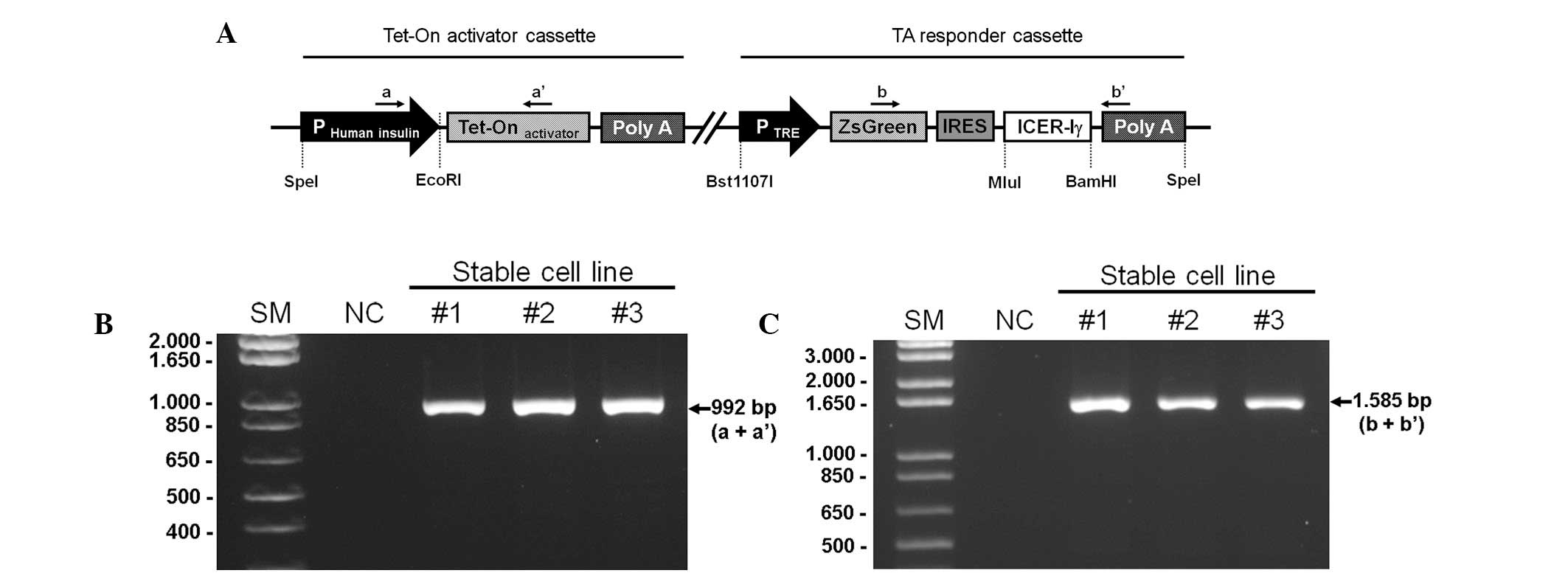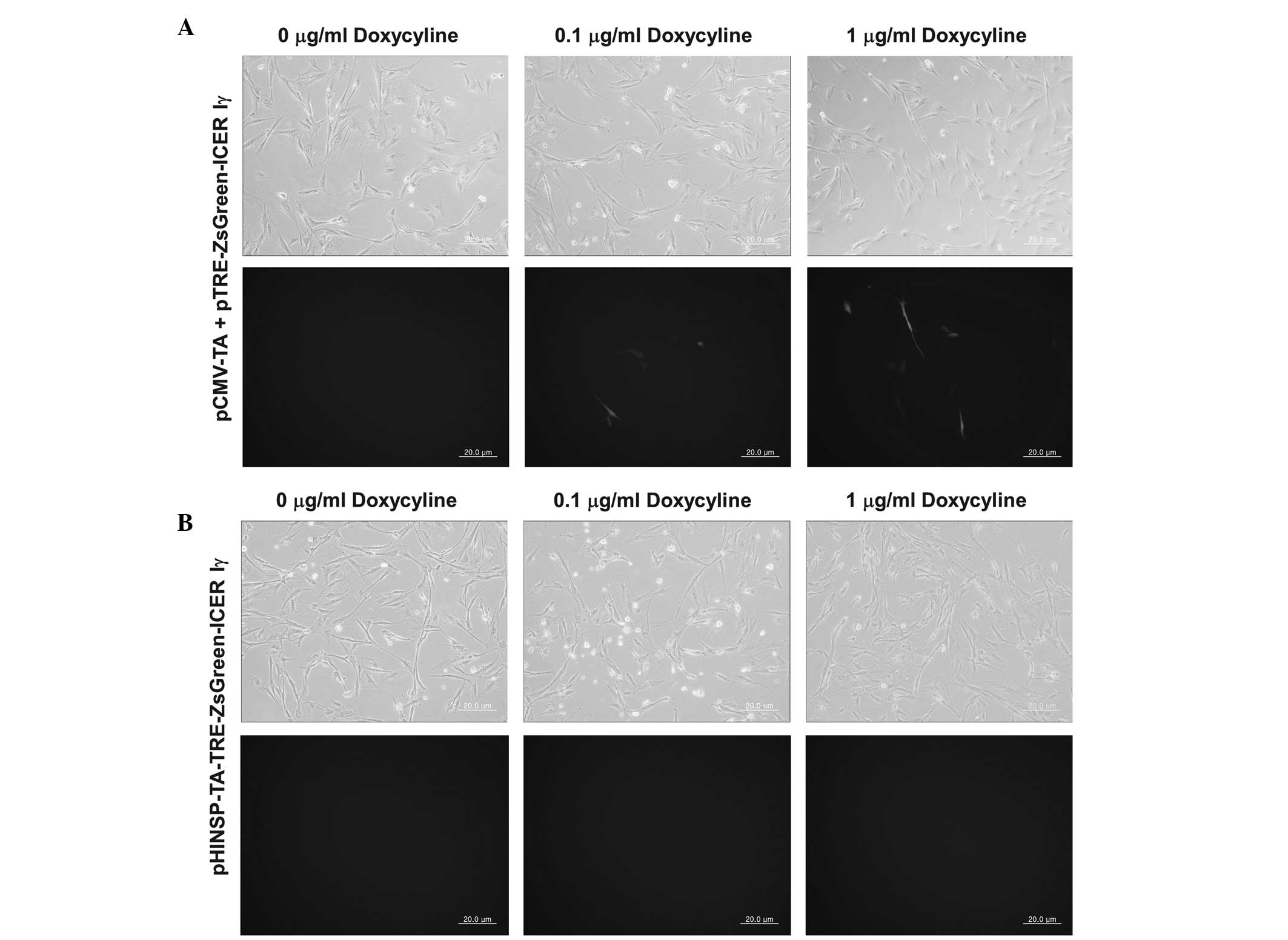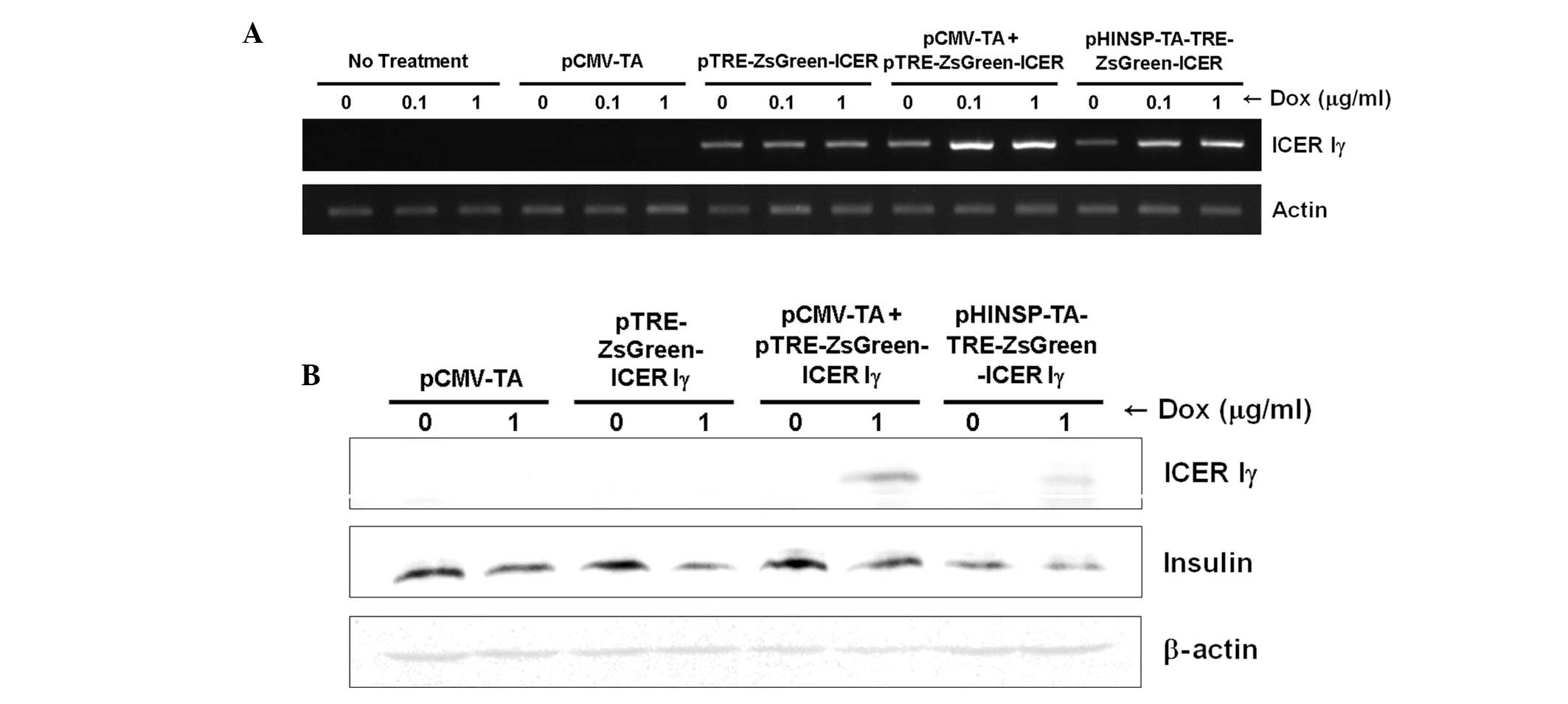|
1
|
Leonard J, Serup P, Gonzalez G, Edlund T
and Montminy M: The LIM family transcription factor Isl-1 requires
cAMP response element binding protein to promote somatostatin
expression in pancreatic islet cells. Proc Natl Acad Sci USA.
89:6247–6251. 1992. View Article : Google Scholar
|
|
2
|
Barnett DW, Pressel DM, Chern HT, Scharp
DW and Misler S: cAMP-enhancing agents ‘permit’ stimulus-secretion
coupling in canine pancreatic islet beta-cells. J Membr Biol.
138:113–120. 1994.
|
|
3
|
Ortmeyer HK: Insulin decreases skeletal
muscle cAMP-dependent protein kinase (PKA) activity in normal
monkeys and increases PKA activity in insulin-resistant rhesus
monkeys. J Basic Clin Physiol Pharmacol. 8:223–235. 1997.
View Article : Google Scholar : PubMed/NCBI
|
|
4
|
Seino S, Takahashi H, Fujimoto W and
Shibasaki T: Roles of cAMP signalling in insulin granule
exocytosis. Diabetes Obes Metab. 11(Suppl 4): 180–188. 2009.
View Article : Google Scholar
|
|
5
|
Foulkes NS, Borrelli E and Sassone-Corsi
P: CREM gene: use of alternative DNA-binding domains generates
multiple antagonists of cAMP-induced transcription. Cell.
64:739–749. 1991. View Article : Google Scholar : PubMed/NCBI
|
|
6
|
Mioduszewska B, Jaworski J and Kaczmarek
L: Inducible cAMP early repressor (ICER) in the nervous system - a
transcriptional regulator of neuronal plasticity and programmed
cell death. J Neurochem. 87:1313–1320. 2003. View Article : Google Scholar : PubMed/NCBI
|
|
7
|
Inada A, Hamamoto Y, Tsuura Y, Miyazaki J,
Toyokuni S, Ihara Y, Nagai K, Yamada Y, Bonner-Weir S and Seino Y:
Overexpression of inducible cyclic AMP early repressor inhibits
transactivation of genes and cell proliferation in pancreatic beta
cells. Mol Cell Biol. 24:2831–2841. 2004. View Article : Google Scholar : PubMed/NCBI
|
|
8
|
Inada A, Someya Y, Yamada Y, Ihara Y,
Kubota A, Ban N, Watanabe R, Tsuda K and Seino Y: The cyclic AMP
response element modulator family regulates the insulin gene
transcription by interacting with transcription factor IID. J Biol
Chem. 274:21095–21103. 1999. View Article : Google Scholar : PubMed/NCBI
|
|
9
|
Gossen M and Bujard H: Tight control of
gene expression in mammalian cells by tetracycline-responsive
promoters. Proc Natl Acad Sci USA. 89:5547–5551. 1992. View Article : Google Scholar : PubMed/NCBI
|
|
10
|
Zhou X, Vink M, Klaver B, Berkhout B and
Das AT: Optimization of the Tet-On system for regulated gene
expression through viral evolution. Gene Ther. 13:1382–1390. 2006.
View Article : Google Scholar : PubMed/NCBI
|
|
11
|
Gossen M, Freundlieb S, Bender G, Müller
G, Hillen W and Bujard H: Transcriptional activation by
tetracyclines in mammalian cells. Science. 268:1766–1769. 1995.
View Article : Google Scholar : PubMed/NCBI
|
|
12
|
Saudek F: Gene therapy in the treatment of
diabetes mellitus. Cas Lek Cesk. 142:523–527. 2003.(In Czech).
|
|
13
|
Driver JP, Serreze DV and Chen YG: Mouse
models for the study of autoimmune type 1 diabetes: a NOD to
similarities and differences to human disease. Semin Immunopathol.
33:67–87
|
|
14
|
Jung EM, Kim YK, Lee GS, Hyun SH, Hwang WS
and Jeung EB: Establishment of inducible cAMP early repressor
transgenic fibroblasts in a porcine model of human type 1 diabetes
mellitus. Mol Med Rep. 6:239–245
|
|
15
|
Bodor J, Fehervari Z, Diamond B and
Sakaguchi S: ICER/CREM-mediated transcriptional attenuation of IL-2
and its role in suppression by regulatory T cells. Eur J Immunol.
37:884–895. 2007. View Article : Google Scholar : PubMed/NCBI
|
|
16
|
Bodor J, Spetz AL, Strominger JL and
Habener JF: cAMP inducibility of transcriptional repressor ICER in
developing and mature human T lymphocytes. Proc Natl Acad Sci USA.
93:3536–3541. 1996. View Article : Google Scholar : PubMed/NCBI
|
|
17
|
Inada A, Weir GC and Bonner-Weir S:
Induced ICER Igamma down-regulates cyclin A expression and cell
proliferation in insulin-producing beta cells. Biochem Biophys Res
Commun. 329:925–929. 2005. View Article : Google Scholar : PubMed/NCBI
|
|
18
|
Molina CA, Foulkes NS, Lalli E and
Sassone-Corsi P: Inducibility and negative autoregulation of CREM:
an alternative promoter directs the expression of ICER, an early
response repressor. Cell. 75:875–886. 1993. View Article : Google Scholar
|
|
19
|
Odagiri H, Wang J and German MS: Function
of the human insulin promoter in primary cultured islet cells. J
Biol Chem. 271:1909–1915. 1996. View Article : Google Scholar : PubMed/NCBI
|
|
20
|
Burkhardt BR, Loiler SA, Anderson JA,
Kilberg MS, Crawford JM, Flotte TR, Goudy KS, Ellis TM and Atkinson
M: Glucose-responsive expression of the human insulin promoter in
HepG2 human hepatoma cells. Ann NY Acad Sci. 1005:237–241. 2003.
View Article : Google Scholar : PubMed/NCBI
|
|
21
|
Rockman MV and Wray GA: Abundant raw
material for cis-regulatory evolution in humans. Mol Biol Evol.
19:1991–2004. 2002. View Article : Google Scholar : PubMed/NCBI
|
|
22
|
Ludwig MZ and Kreitman M: Evolutionary
dynamics of the enhancer region of even-skipped in Drosophila. Mol
Biol Evol. 12:1002–1011. 1995.PubMed/NCBI
|
|
23
|
Hay CW and Docherty K: Comparative
analysis of insulin gene promoters: implications for diabetes
research. Diabetes. 55:3201–3213. 2006. View Article : Google Scholar : PubMed/NCBI
|
|
24
|
Daniel PB, Walker WH and Habener JF:
Cyclic AMP signaling and gene regulation. Annu Rev Nutr.
18:353–383. 1998. View Article : Google Scholar : PubMed/NCBI
|
|
25
|
Inagaki N, Maekawa T, Sudo T, Ishii S,
Seino Y and Imura H: c-Jun represses the human insulin promoter
activity that depends on multiple cAMP response elements. Proc Natl
Acad Sci USA. 89:1045–1049. 1992. View Article : Google Scholar : PubMed/NCBI
|
|
26
|
Foulkes NS and Sassone-Corsi P:
Transcription factors coupled to the cAMP-signalling pathway.
Biochim Biophys Acta. 1288:F101–F121. 1996.PubMed/NCBI
|
|
27
|
Ishihara H, Asano T, Tsukuda K, Katagiri
H, Inukai K, Anai M, Kikuchi M, Yazaki Y, Miyazaki JI and Oka Y:
Pancreatic beta cell line MIN6 exhibits characteristics of glucose
metabolism and glucose-stimulated insulin secretion similar to
those of normal islets. Diabetologia. 36:1139–1145. 1993.
View Article : Google Scholar
|
|
28
|
Miyazaki J, Araki K, Yamato E, Ikegami H,
Asano T, Shibasaki Y, Oka Y and Yamamura K: Establishment of a
pancreatic beta cell line that retains glucose-inducible insulin
secretion: special reference to expression of glucose transporter
isoforms. Endocrinology. 127:126–132. 1990. View Article : Google Scholar
|
|
29
|
Petersen B, Carnwath JW and Niemann H: The
perspectives for porcine-to-human xenografts. Comp Immunol
Microbiol Infect Dis. 32:91–105. 2009. View Article : Google Scholar : PubMed/NCBI
|


















